
10 Middle Eastern Dishes That Will Make Your Taste Buds Dance
Experience the flavors of the Middle East with these 10 delicious dishes that will make your taste buds dance!

Winter veggies are probably my favorite kind of veggies, likely because most of them are starchier and slightly sweeter. But don’t fear the carbs in winter veggies because your body loves them, and except for the white potato, they won’t spike your insulin or lead to sugar cravings. Some winter veggies are also very low in starches as I'll show you, so it's simple to get an even balance of starches depending on what veggies are available during the cooler months. Winter veggies are also heartier in texture for a special reason. They’re made this way to last over the winter months, much longer than more delicate summer vegetables and fruits like tomatoes and cucumbers. Winter veggies are also so versatile in the kitchen, and the best part is, they’re great comfort foods to warm up to. Pick up these 9 winter veggies next time you’re at the store and craving comfort food. They need nothing more than a good roast in the oven on a baking sheet at 400 degrees for 1 hour to come out incredibly delicious. Or, serve them in soup if you wish. Either way, they’re fabulous for you, and oh so warming and cozy!
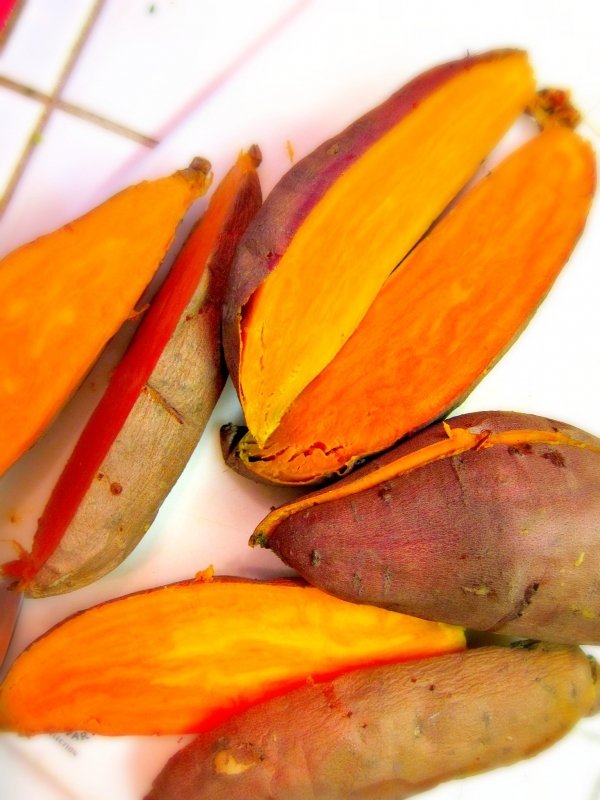 One of the most popular winter veggies is hands down the almighty sweet potato. Rich in heartiness, yet light on the tummy, sweet potatoes are your new best friend in the winter (or summer too). Sweet potatoes are rich in warming properties and very grounding, since they’re a root veggie. Their B vitamin complex and magnesium content make them especially wonderful when you’re stressed. They’re also rich in Vitamin A, which keeps your skin, brain and eyes healthy, and have more potassium than a banana! I love them chopped and roasted, but they’re great any way you choose to enjoy them.
One of the most popular winter veggies is hands down the almighty sweet potato. Rich in heartiness, yet light on the tummy, sweet potatoes are your new best friend in the winter (or summer too). Sweet potatoes are rich in warming properties and very grounding, since they’re a root veggie. Their B vitamin complex and magnesium content make them especially wonderful when you’re stressed. They’re also rich in Vitamin A, which keeps your skin, brain and eyes healthy, and have more potassium than a banana! I love them chopped and roasted, but they’re great any way you choose to enjoy them.
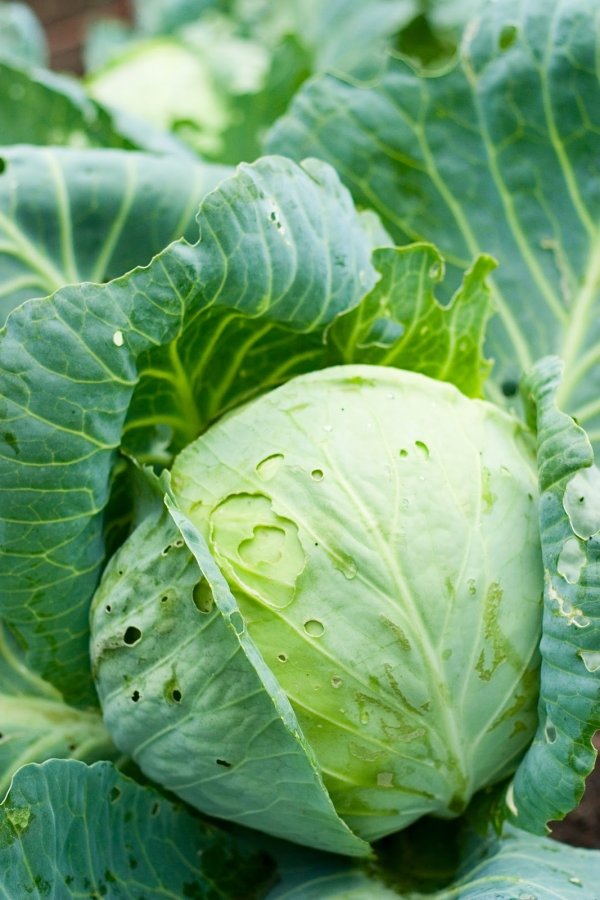 While not a sweet veggie, cabbage is one of the healthiest winter veggies to enjoy. If you haven’t noticed, cabbage keeps FOREVER! You can store it in the fridge for at least a month and it won’t even appear to have aged. Cabbage contains natural pre-biotic properties, which is one reason so many people can it and use it to make sauerkraut and kimchi, which is fermented cabbage. Cabbage cooked up well and steamed is wonderful for a different approach to sauteed kale, or you can roast wedges in the oven if you wish. Either way, cabbage’s Vitamin C content is sure to keep your health in tip top shape this winter. It’s easier to digest cooked than raw, and purple cabbage is slightly higher in antioxidants if that’s a concern of yours. Both green and purple cabbage are excellent for your heart!
While not a sweet veggie, cabbage is one of the healthiest winter veggies to enjoy. If you haven’t noticed, cabbage keeps FOREVER! You can store it in the fridge for at least a month and it won’t even appear to have aged. Cabbage contains natural pre-biotic properties, which is one reason so many people can it and use it to make sauerkraut and kimchi, which is fermented cabbage. Cabbage cooked up well and steamed is wonderful for a different approach to sauteed kale, or you can roast wedges in the oven if you wish. Either way, cabbage’s Vitamin C content is sure to keep your health in tip top shape this winter. It’s easier to digest cooked than raw, and purple cabbage is slightly higher in antioxidants if that’s a concern of yours. Both green and purple cabbage are excellent for your heart!
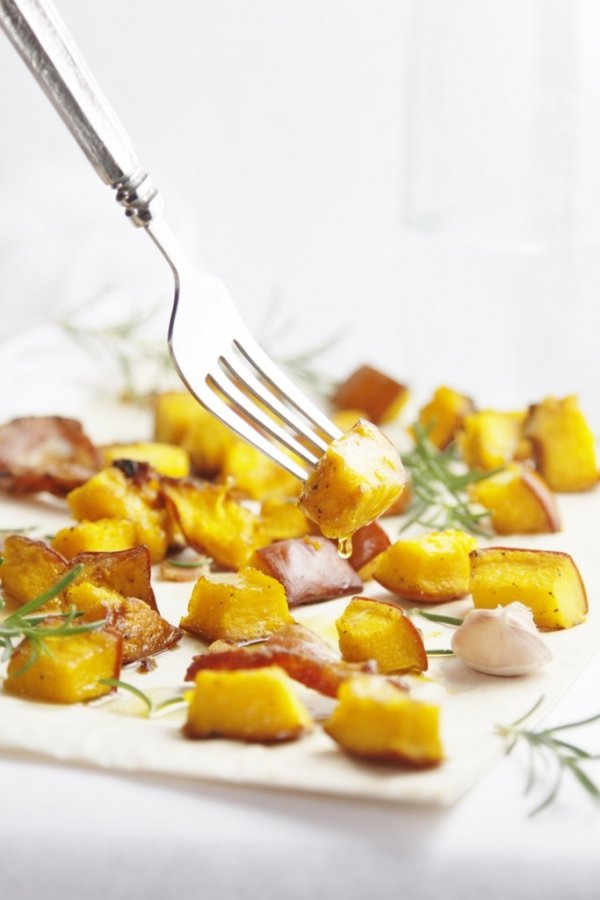 I’m such a fan of pumpkin that I go through at least 3 of the organic cans of pumpkin a week. I wish I was kidding, but I just can’t get enough. Whole pumpkins are also amazing for you. I love when you roast a mini pie pumpkin and the insides actually resemble spaghetti squash, which surprises most people. Pumpkin is so awesome for your brain and body too. It contains tryptophan, the amino acid that calms anxiety, and can make you sleepy, though it doesn’t seem to have that effect on most people. Pumpkin’s high fiber content makes it especially filling, yet it’s one of the easiest veggies to digest since it’s high in water content. It’s actually one of the best sources of vegetables for people with IBS since it’s high in soluble fiber. Pumpkin is also great for your skin due to its Vitamin A content. Whether you eat it canned or roast it yourself, pumpkin is one of those foods that every woman should make a point to enjoy. Your skin will thank me later, along with your digestive system!
I’m such a fan of pumpkin that I go through at least 3 of the organic cans of pumpkin a week. I wish I was kidding, but I just can’t get enough. Whole pumpkins are also amazing for you. I love when you roast a mini pie pumpkin and the insides actually resemble spaghetti squash, which surprises most people. Pumpkin is so awesome for your brain and body too. It contains tryptophan, the amino acid that calms anxiety, and can make you sleepy, though it doesn’t seem to have that effect on most people. Pumpkin’s high fiber content makes it especially filling, yet it’s one of the easiest veggies to digest since it’s high in water content. It’s actually one of the best sources of vegetables for people with IBS since it’s high in soluble fiber. Pumpkin is also great for your skin due to its Vitamin A content. Whether you eat it canned or roast it yourself, pumpkin is one of those foods that every woman should make a point to enjoy. Your skin will thank me later, along with your digestive system!
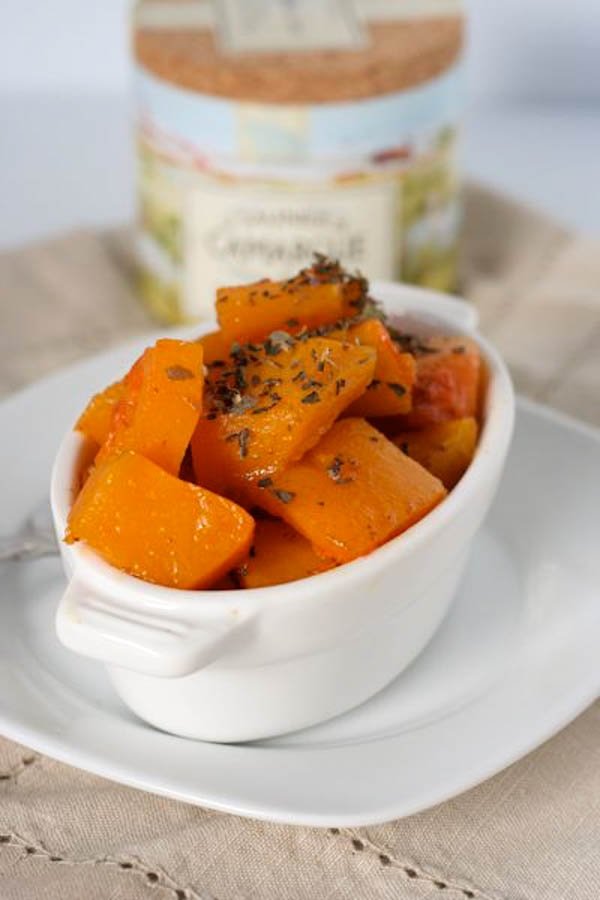 One of my favorite forms of winter squash is butternut. It’s sweet, slightly nutty, yet very easy on the glycemic index. It contains the same low carb profile as pumpkin, along with all the digestive and skin benefits too. Butternut squash is excellent to make your own fries with in the oven, roast it into cubes or you can roast it whole and eat it mashed. The canned varieties are surprisingly good as well, and a great way to enjoy it if you can’t find it whole.
One of my favorite forms of winter squash is butternut. It’s sweet, slightly nutty, yet very easy on the glycemic index. It contains the same low carb profile as pumpkin, along with all the digestive and skin benefits too. Butternut squash is excellent to make your own fries with in the oven, roast it into cubes or you can roast it whole and eat it mashed. The canned varieties are surprisingly good as well, and a great way to enjoy it if you can’t find it whole.
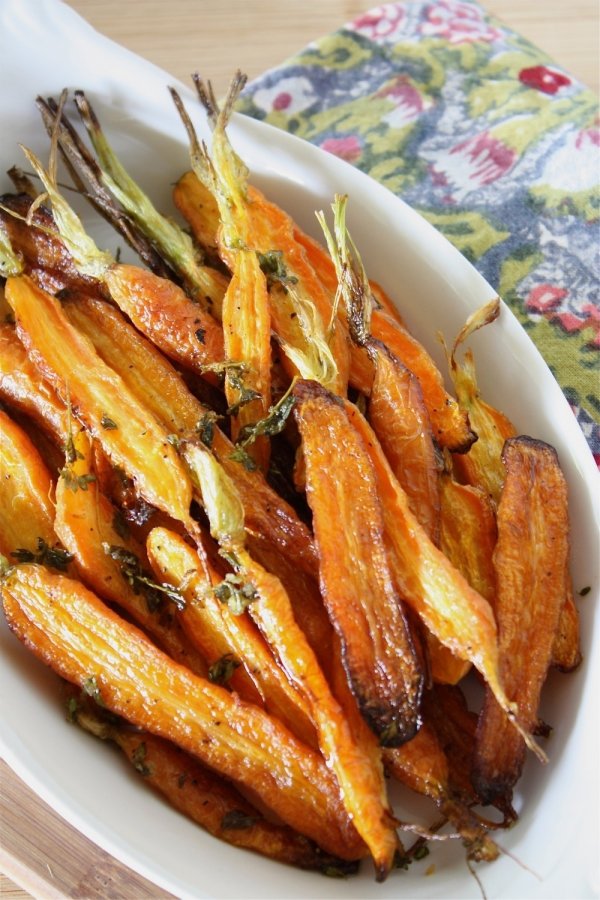 Never forget about the humble carrot! Fall and winter are the best times to enjoy carrots, and they keep for months if you buy them whole and wash and dry them appropriately. Carrots are rich in Vitamins A and C, along with potassium. They’re also rich in insoluble fiber, and great for your skin, eyes and hair. Carrots also contain a good bit of magnesium, which relaxes you and aids in muscle recovery, along with calming anxiety. They’re much easier to digest when well cooked, and very warming to the body this way as well. I specifically love them chopped into soups and well cooked.
Never forget about the humble carrot! Fall and winter are the best times to enjoy carrots, and they keep for months if you buy them whole and wash and dry them appropriately. Carrots are rich in Vitamins A and C, along with potassium. They’re also rich in insoluble fiber, and great for your skin, eyes and hair. Carrots also contain a good bit of magnesium, which relaxes you and aids in muscle recovery, along with calming anxiety. They’re much easier to digest when well cooked, and very warming to the body this way as well. I specifically love them chopped into soups and well cooked.
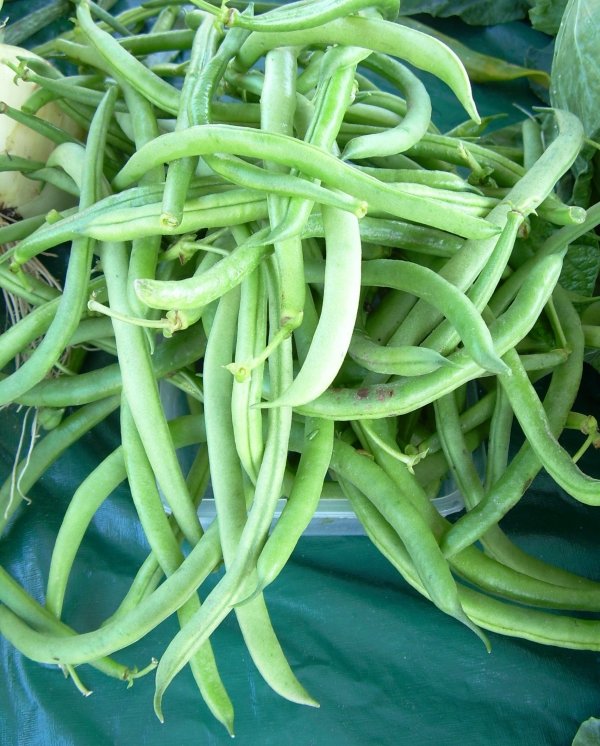 Green beans are another winter veggie I happen to love. I’m not a snob to the no salt added canned varieties either. Green beans are great for you, and are very easy to digest as well. They also contain less starch than any other bean, and have a decent amount of protein. Green beans are rich in antioxidants, Vitamin C and a little iron as well. You can roast them, saute them or boil them. I prefer steaming them well to soften them, or enjoy them in soup.
Green beans are another winter veggie I happen to love. I’m not a snob to the no salt added canned varieties either. Green beans are great for you, and are very easy to digest as well. They also contain less starch than any other bean, and have a decent amount of protein. Green beans are rich in antioxidants, Vitamin C and a little iron as well. You can roast them, saute them or boil them. I prefer steaming them well to soften them, or enjoy them in soup.
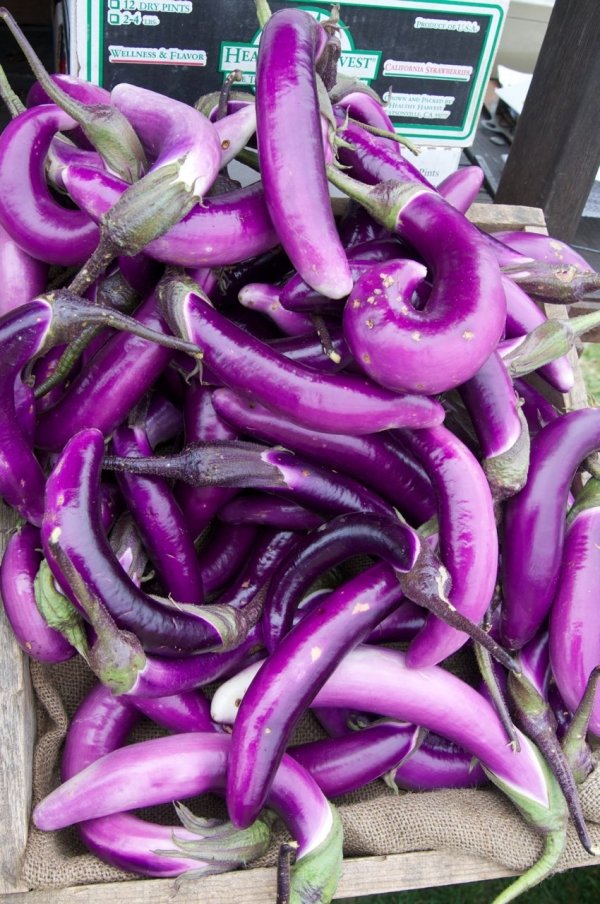 I’m actually not a fan of eggplant, but many people are and it is excellent for you! Eggplant is rich in Vitamin C and antioxidants, along with fiber. In fact, its deep purple hues ensure it’s loaded with antioxidants that are great for your heart and skin. I recommend roasting it in slices to cook it well, since it can be a little difficult to digest. Eggplant is nice and firm so it holds up well in cooking and can even be a low carb replacement for breads or mini pizzas!
I’m actually not a fan of eggplant, but many people are and it is excellent for you! Eggplant is rich in Vitamin C and antioxidants, along with fiber. In fact, its deep purple hues ensure it’s loaded with antioxidants that are great for your heart and skin. I recommend roasting it in slices to cook it well, since it can be a little difficult to digest. Eggplant is nice and firm so it holds up well in cooking and can even be a low carb replacement for breads or mini pizzas!
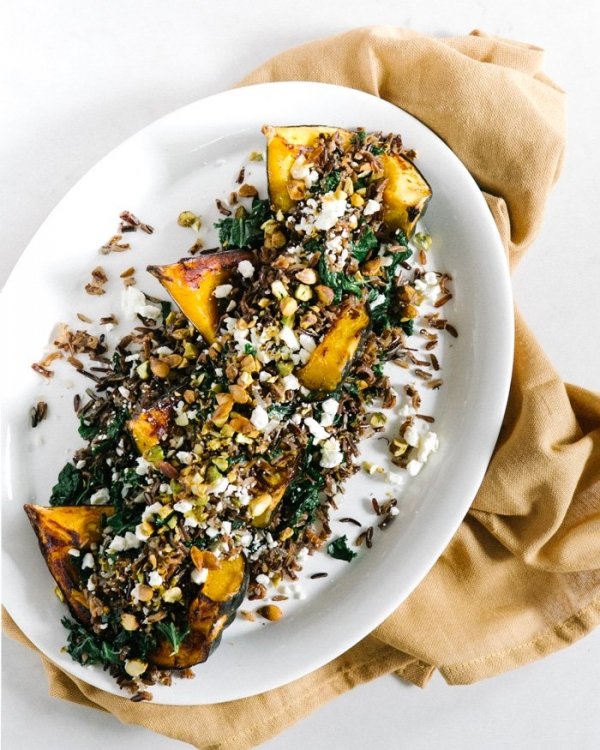 Just like butternut squash, acorn squash is a sweet squash, not like yellow summer squash. Acorn squash is probably one of my favorite squash varieties, and though it is very sweet, it’s pretty easy on the glycemic index, rich in Vitamins A and C and high in potassium to beat bloat. I love to roast it whole and cut it open into halves to enjoy it with a smear of coconut oil and cinnamon for a delectable dinner treat. It’s also great sliced into rings before baking, and really tasty the next day as a snack if you let it cool in the fridge overnight.
Just like butternut squash, acorn squash is a sweet squash, not like yellow summer squash. Acorn squash is probably one of my favorite squash varieties, and though it is very sweet, it’s pretty easy on the glycemic index, rich in Vitamins A and C and high in potassium to beat bloat. I love to roast it whole and cut it open into halves to enjoy it with a smear of coconut oil and cinnamon for a delectable dinner treat. It’s also great sliced into rings before baking, and really tasty the next day as a snack if you let it cool in the fridge overnight.
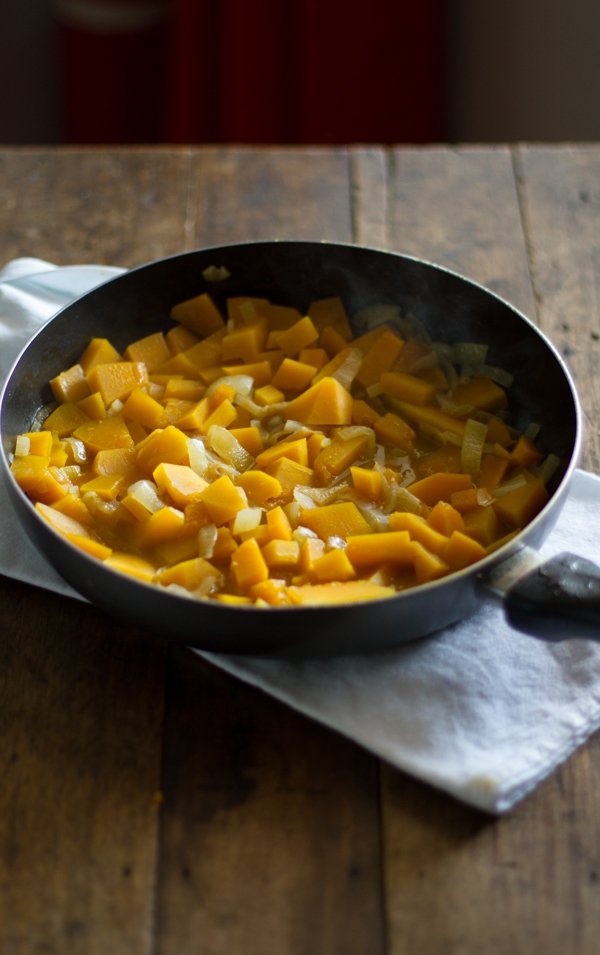 Kabocha squash has taken the healthy blogging world by storm. Almost every food blogger I know loves this squash, and with good reason. Kabocha squash is one of the sweetest squash varieties to get your hands on, and it’s amazing in density, sweetness and yet still very tender. It basically melts in your mouth, which is pretty incredible, let me tell you. It’s only available in the fall and winter months, so be sure to snag some up while you can. Kabocha, like all winter squash, is rich in Vitamins A and C, along with fiber, magnesium and potassium.
Kabocha squash has taken the healthy blogging world by storm. Almost every food blogger I know loves this squash, and with good reason. Kabocha squash is one of the sweetest squash varieties to get your hands on, and it’s amazing in density, sweetness and yet still very tender. It basically melts in your mouth, which is pretty incredible, let me tell you. It’s only available in the fall and winter months, so be sure to snag some up while you can. Kabocha, like all winter squash, is rich in Vitamins A and C, along with fiber, magnesium and potassium.
Be sure to consume a variety of winter veggies while you can. Summer will be here before you know it, and warming foods won’t sound as appealing as they do in the cooler months when you need something comforting, yet still healthy too. Do you have a favorite winter veggie? How do you like to cook it?

Experience the flavors of the Middle East with these 10 delicious dishes that will make your taste buds dance!

Pairing cocktails with appetizers isn’t just about flavor—it’s about creating a memorable experience. Think of the spicy kick of shrimp tacos cooled by a zesty Margarita or the rich taste of bacon-wrapped dates paired with a warm Old Fashioned. These combinations elevate any gathering, making each bite and sip a delightful adventure.

Discover how a cup of coffee before your workout can enhance your performance, improve focus, and provide numerous health benefits. This listicle covers everything from increased fat burning to enhanced endurance.

Discover unique and delicious panini recipes that you can make using your Cuisinart Griddler. From savory to sweet, these recipes will elevate your sandwich game.

Learn about the different types of beans and how to choose the right one for your cold brew coffee.

Uncover the rich history, unique baking techniques, and the versatility of croissants. This listicle provides 20 compelling reasons why croissants have earned their place as a beloved pastry.

Discover 7 delicious strawberry desserts that will make your mouth water. From strawberry ice cream to rhubarb crisp, these recipes are sure to satisfy your sweet tooth.

Discover unique and mouthwatering tea sandwich recipes that will surprise your taste buds.

Discover tea sandwich recipes that are perfect for various events, whether formal or casual.

Treat yourself to these 3 delicious strawberry desserts that taste so good you'll want seconds. From strawberry cheesecake to strawberry mousse, these recipes are sure to satisfy your sweet tooth.

Coffee has a bad reputation, but did you know that it also has some surprising health benefits? Find out why you should feel good about your morning cup of joe.

Looking to shed a few pounds? These five foods have been shown to boost your metabolism and help you lose weight more effectively.

Intermittent fasting is a popular eating pattern that has numerous benefits for health and weight loss. This blog post explores the pros and cons of intermittent fasting and provides tips for getting started.

It can be tough to eat healthy when you're busy and on the go. Check out these 5 easy and healthy snack ideas that are perfect for when you're on the move.

Discover the secrets to making the perfect cold brew coffee every time. Learn the tips and tricks to make the perfect cup.

Learn the secrets to preparing delicious meals quickly with minimal effort!
Sign up for our newsletter.